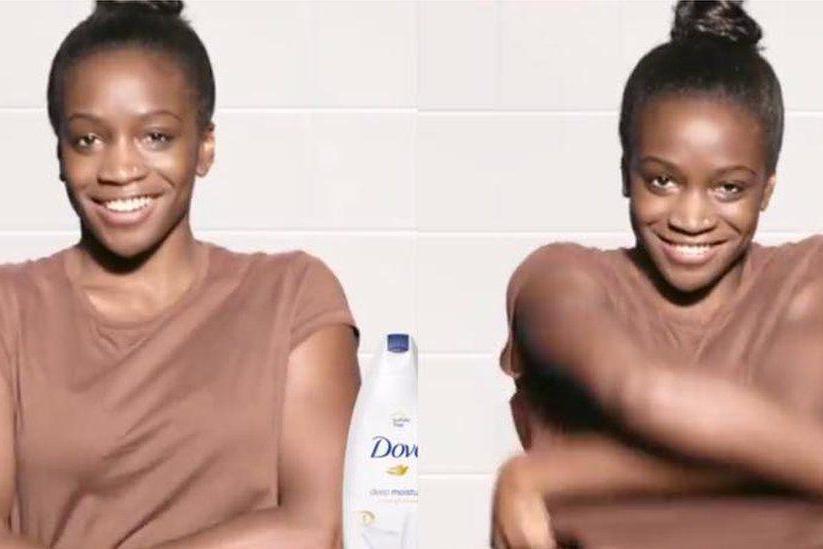Dove is one of many beauty brands accused of creating 'racist' adverts
How is this happening?

Dove have come under fire for releasing an advert on Facebook featuring a black woman turning into a white woman after supposedly using the beauty brand’s body lotion.
Critics were quick to accuse the brand of aligning use of their body cleansing product with a racial transformation, which inadvertently presents the former as “dirty” and the latter as “clean” within the context of the ad.
Dove has since issued an apology and the incriminating video has been removed.
“I think Dove is now clickbait fodder,” says Cui Su, an advertising course leader at London College of Communication.
“Has anyone actually seen the whole Dove ad or just the single image posted by a media savvy person?
"More likely, the posted image and its circulation meant that the original ad was de-contextualised and distorted. It happens a lot in social media and especially with big brands," she explained.
Social media users were quick to point out that Dove were also accused of racism in 2011.
"Modern-day racial and gender prejudices have morphed into unconscious biases, and the popular reaction to the Dove ad mirrors that," Jaywant Singh, professor of marketing at Kingston University told The Independent.
"On the face of it, the Dove ad comes across as racist, or more simply, as poorly executed by a culturally insensitive agency.
"On the other hand, the audience reactions also show that the biases are still deeply-entrenched, and in that sense the ad serves as a ‘mirror to our prejudices’," he added.
Indeed, the Dove debacle is just one of many in a sea of beauty adverts that have similarly “missed the mark.”
It was only six months ago when competitor brand Nivea were forced to remove an advert from Facebook that was labelled discriminatory.
Intended to market the German skincare brand’s new “invisible” deodorant range, the ad bore the slogan “white is purity” alongside the tagline of “keep it clean, keep bright. Don’t let anything ruin it.”
The post was aimed at the brand’s Middle East audience; however, the campaign went out to more than 19 million fans when it was posted on Facebook.
The campaign was widely ridiculed online, with right-wing Twitter accounts adopting it alongside images of Hitler with one user tweeting: “#Nivea: the official moisturiser/anti-perspirant of the #AltRight."
Like Dove, Nivea quickly removed the ad from Facebook and issued an apology for the “misleading” post which they explained went against their core values.
Then there was the meme uploaded to Instagram by popular vegan brand Tarte Cosmetics in September, which oddly included the racial slur “ching chong” alongside an image of its eye shadow palette.
The CEO later issued an apology via the photo-sharing app.
Worse still was the Malaysian beauty chain, Watsons Malaysia, who sparked a furore earlier this year when they released a Malay folklore-inspired video which showed a wealthy merchant being seduced by a female voice whose face had been obviously painted black.
In the video, the woman is depicted as undesirable, with the merchant asking “where are the lights?” after seeing her face.
Why is it that in 2017, beauty brands – large and small – continue to “miss the mark” when it comes to race?
"If this was a small brand would there be such a furore?" asks Singh, who questions the public's outraged response to ads which are dubbed "racist."
"The modern-day society in general is averse to being seen as racist, which is feared more than racism itself. Once an ad has a dubious connotation, many are quick to take side, to declare their lack of racism too. Whatever happened to just not buying the product?
"Such demonstrations are akin to wearing ethical consumerism on your sleeve. The Dove ad is perhaps wrong but is it really racist? Or has racism been taken out of the intended context to satisfy a different purpose?"
Issues regarding race are particularly prevalent when it comes to the beauty industry because, as Singh explains, "these products are often consumed by an individual to signal their desired self-identity, which in turn is shaped by the society and its prejudices."
Subscribe to Independent Premium to bookmark this article
Want to bookmark your favourite articles and stories to read or reference later? Start your Independent Premium subscription today.
Join our commenting forum
Join thought-provoking conversations, follow other Independent readers and see their replies